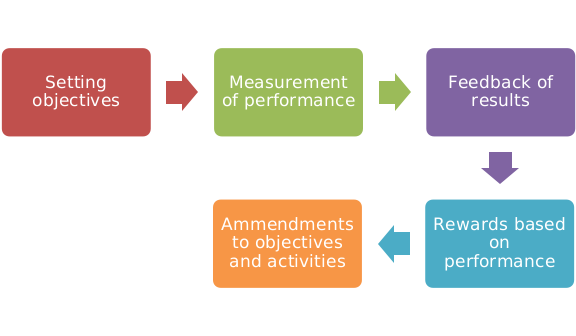INTRODUCTION to PERFORMANCE MANAGEMENT
Performance management is a step-wise approach that should be followed systematically. It is a process through which the performance of employees is measured, and they must be satisfied with the system and should also feel that it adds some value to their day-to-day activities (Baron and Armstrong, 2007). Performance management is a holistic approach that brings together different elements and makes successful practice of people management, including learning and development. The report, explained by our experts in online assignment help, undertakes the Hilton group of hotels as an example to understand the importance of performance management and the reasons behind why it becomes complex and could be misunderstood.
It analyzes that performance management is not just related to analyzing the performance of employees but also needs to manage it and identify certain factors that hinder the efficiency of employee's performance. Furthermore, the study also focuses on the different elements of people management practice, such as motivation, training and development, and performance appraisals, as well as other aspects dealing with different situations at Hilton (Beardwell and Claydon, 2010). Moreover, the report also discusses the detailed understanding of each of the elements and describes their roles in managing performance. In the end, the report provides recommendations based on the implementation of different elements and the ways through which it helps in developing the performance of employees.

TASK 1 PERFORMANCE MANAGEMENT
Understanding Performance Management
Performance management is an approach that is adopted by every organization to monitor and review the performance of their employees and understand the level that needs to be achieved (Marchington and Wilkinson, 2005). The focus of effective performance management is on the improvement of quality leadership, managing, and learning different practices in business. In today's competitive era, performance management plays a significant role in managing human resources that assist in achieving the set targets of the hotel. Under this approach, both managers and subordinates work together to support and plan the targets and goals to achieve aims and objectives. The key focus of management is on the individual's performance, which is continuously reviewed through appraisal methods, and their efficiency is measured by analyzing the availability of resources and their ability to accomplish the tasks.
Performance management also plays a significant role in understanding the need for training and development for employees to also acquire the necessary skills and competencies for the job (Lasserre, 2012). Through measuring the performance, it benefits the business in terms of gaining better revenues through reducing costs, increasing sales, and motivating the workforce to work with more efficiency.
Performance Management is Complex and Capable of Being Misunderstood.
Performance management can be defined as the process that involves collecting and receiving information that is linked with the performance of staff members to improve the efficiency of people and achieve the set targets (Pettinger, 2010). Sometimes, it is complex to understand performance management, and it is also misunderstood by different individuals. Three critical components of performance management are planning, measurement, and management. Performance management is complex as there are no fixed criteria available to measure the performance or work done by individuals in business. On the other hand, the perception of every individual and business is different, and it affects the understanding of performance management. The perception of every individual is different in organizations, and it leads to misunderstanding the meaning of performance management.
In Hilton, the entire organization is facing the problem of understanding performance management due to different definitions and theories given by various authors. There is no direct meaning available; therefore, every employee working in an organization perceives a different meaning of performance management, and hence, it acts as a hurdle for the whole business. The lack of knowledge and misunderstanding among the employees hinder the performance and productivity of employees in the enterprise (Scullion and Collings, 2011). Management must clear the concept of performance management so that workers can effectively utilize the resources and attain goals. However, performance management is beneficial for business as it is considered one of the best approaches through which the performance of employees can be improved and monitored effectively. Hence, it directly benefits the organization and, in turn, increases profitability. There are four main stakeholders in business, and their perceptions towards performance management are enumerated below:
HR manager: According to the view of the HR manager of a hotel, performance management is the process through which managers and subordinates work together to attain desired goals (Guest, 2011). It directly controls and monitors the work done by employees in the organization, and thus it helps businesses achieve the desired goals. The performance management process involves setting objectives and providing feedback to employees so that improvement can be done continuously. It is the role of the HR manager to directly focus on improving the performance of workers through employing different methods and attaining goals.
Organization: Under this, performance management can be managed effectively through achieving the goals and objectives and increasing the market share and profitability of the business. Therefore, the management of the hotel should follow performance management for its employees and attain desired goals (Yang, Hong, and Modi, 2011). Thus, it will directly improve the financial performance of the company and help employees focus on achieving the mission and vision of the business.
Line managers: As per the view of line managers of Hilton, performance management is very essential because it directly helps workers in increasing productivity and achieving desired targets (Strandberg, 2009). Also, it is the responsibility of line managers to manage different employees and motivate them to attain goals. Line managers of every department are in direct contact with every employee so that they can motivate them to achieve tasks as assigned on a monthly or daily basis.
Employees: They are the main integral part of the organization and in their view, performance management is the way to develop their professionalism. Employing different performance management techniques and reviewing them on tia timely basis, helps employees to develop their skills and knowledge and attain goals (Baron and Armstrong, 2007). Hence, this does not develop complexity in business.
Performance Management Theories
Performance management is the concept in human resource management and it is a continuous process of identifying, developing, and measuring the performance of employees and also aligning the performance with the strategic goals and objectives. Sometimes, performance management is mistaken and considered as performance appraisal, but the latter is just a part of the former (Lasserre, 2012). Various experts explained that there is no single universally accepted model of the theory of performance management. The performance management cycle has five elements, which are as follows:
- Objectives setting
- Measuring performance
- Feedback of results
- Rewards based on outcomes
- Amendments to objectives and activities

The above-mentioned elements are described as one of the theories of the performance management cycle. The cycle starts with setting the objectives as performance standards, which are successfully met when the last step in the cycle is achieved as amendments to set objectives and activities (Guest, 2011). Regarding this, after setting the objectives, performance has to be measured effectively to set objectives for taking appropriate action according to which workers effectively achieve organizational goals and objectives. Employees also try to achieve individual goals in terms of gaining rewards and incentives so that the performance management cycle can carry on. Also, feedback is the stage and it is given when all the activities of employees are assessed and evaluated. In the end, it sets the basis for which amendments in activities and objectives are easily met by top-level authorities so that organizational objectives can be achieved.
Thus, according to the above approach, these five steps in the performance management cycle are the basis of improving staff performance and achieving goals. There are two basic theories, which are explained under
Goal-setting theory: The theory states that individual goals and objectives are established in such a manner that it helps in motivating staff to achieve superior performance. It is because employees keep on following their goals, and in case the goals are not achieved for some or other reasons, performance is improved through training, or goals are modified and become more realistic (Pettinger, 2010). There are different elements, such as measurement, rewards, feedback, and amendments, but theory helps in improving the performance of employees. As when it is said that goals are modified or it means that it is not achieved. Furthermore, it states that if the performance is improved, then it results in attaining major goals and objectives of performance management. Leaders of businesses often try to improve the performance of their employees to achieve the set objectives and implement them in business. Also, there are possibilities that several goals are complex and cannot be altered because of their inflexible nature. Thus, the objectives of performance management can be achieved through improvement in performance and attaining desired goals (Beardwell and Claydon, 2010).
Expectancy theory: This theory is based on the hypothesis that employees adjust their nature in the organization based on anticipated satisfaction of valued goals that have been set by them. Moreover, employees modify their behavior in such a way that it is most likely to lead them and attain goals. Thus, it can be said that this theory is based on the fact that individuals often mold their behavior as per the set standards and attain goals (Scullion and Collings, 2011). Further, it helps the individual to achieve the set objectives and effectively attain profits. Also, this theory is related to performance management, as it is believed that performance is always influenced by the expectations of individuals concerning future events.
REFERENCES
- Baron, A. and Armstrong, M., 2007. Human Capital Management. Kogan Page.
- Beardwell, I. and Claydon, C., 2010. Human Resource Management: A Contemporary Approach. Harlow: FT Prentice Hall.
- Lasserre, P., 2012. Global Strategic Management. Palgrave.
- Marchington, M. and Wilkinson, A., 2005. Human Resource Management at Work. CIPD.
- Pettinger, R., 2010. Organizational Behaviour: Performance Management in Practice. Routledge.
- Scullion, H. and Collings, D. G., 2011. Global Talent Management. Routledge.
Related Samples:
Business Management Policies and their Implementation


 Company
Company













